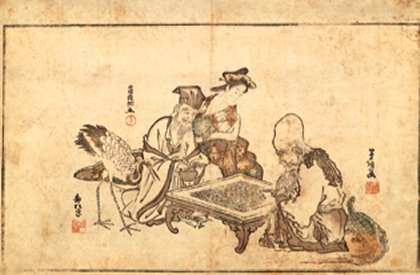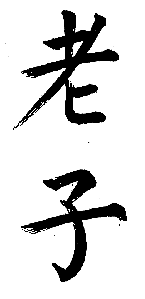"Jing " (or "Ching ") is the word the Chinese apply to sacred texts. It's often translated as "classic." In the US, surely the most famous "jing " (at least since the dawning of the Age of Aquarius and its channeling hordes) is the Yi Jing (or I Ching), usually translated as The Book of Changes. "Dao " (or "tao ") and "de " (or "teh ") are two of the central concepts described in the text, and the title, Dao De Jing is said to derive from the fact that the book has, by tradition, come to be divided into two major parts, one of which begins with the word "dao," the other with a discussion of "de."
(In the Absolutely Trivial Department, recent archaeological finds have unearthed our oldest copies and, although very little new has been gleaned from these discoveries, they all reverse the order of the two parts from that which has been used in more recent centuries. Armed with this wisdom, new translations have been hitting the market with the new [er, old] order under the title of De Dao Jing. But either way, it's the same thing. OK?) [Anyone actually interested in this — and there are now more recent discoveries than those alluded to above — look here.]
Ah! Okay. I'll get there. But first... (a tiny bit of patience may pay off and, anyway, you're holding the mouse).
We'll start with a bit of description. Like, it's got eighty-one chapters, none of which is (in English translation) more than a page in text. (Most are a lot shorter and some have only four or five lines.) I have read that there are 5467 Chinese characters in the whole book; not very many, and this brevity seems to have made it fair game for anyone who has a few hours to put to the task of attempting a translation. Jacob Needleman in his introduction to the Feng and English version asserts that it is the world's most translated text after The Holy Bible. I have no idea how to go about verifying or debunking this absurd claim but I do know that there are tons of English "versions" around - scores actually published by reputable houses. Most that I've read are horrid. (My personal favorite is an English translation of an apparently respected German translation. It reads just as you might imagine. There are, arguably, any number which are worse but I am struck by the concept.)
The Dao part traditionally has thirty-seven chapters, the De part contains the other forty-four verses. And, aside from their extreme brevity, they have (and on this I must trust those who do actually know something of Chinese) frequently, the tone of nursery rhymes. They're playful, and childlike, and immensely powerful. Probably very easy to memorize.

Well, I'm ready, at last, to tell you. And what I can tell you is that you're going to have to decide for yourself.
It appears, much of the time, to be a recital of suggestions for the Emperor (now, in our era of compulsive political correctness, often translated as "leader") to follow in order to rule ("lead") effectively. But they are invariably counter-intuitive and take on the quality of Alice's encounters as she wandered through her looking-glass.
Chief among these suggestions is the
Prime Directive:
The most effective course of action is always...
to do nothing! (wu wei)
And they are mocking:
Slaughter the talented, suggests Lao Zi,
And everybody will benefit. [19]
Wisdom is the understanding that knowledge is useless.
The failure to understand that knowledge is useless is sickness.
[71]
Honor and disgrace are each to be avoided,
he says, adding that:
Good fortune and disaster are identical.
[13]
The only things that valuables are valuable for are attracting thieves, causing the fear of thieves and creating the expense of protecting against the inevitable theft.
Actually those are my words. The Old Boy's are more to the point:
Were wealth scorned, thieves would repent!
[19]
Continuing:
All that is best can be seen to be like water.
Water benefits everything and yet exerts no effort.
Water finds the lowest places, shunned by all.
In this water is the closest to
the Great Way
. [8]
(Don't forget. This is advice for the Emperor!)
To end strife ignore the talented.
Encourage ignorance so the shrewd will be impotent.
[3]
One of my favorites:
When everyone is agreed on what is beautiful,
They have determined what is ugly.
[2]
Another of my favorites:
Best is the emperor who is barely known.
Next the ruler who is loved and honored.
Then the despot who is feared.
And finally the tyrant reviled.
Govern quietly
And the people will realize
They are responsible
For their own well-being.
[17]
Or:
Govern as you would cook small fish.
[60]
More:
Wherever the Way is cherished,
Horses pull ploughs and their dung fertilizes crops.
Wherever the Way is abandoned,
Horses pull cannons and their dung messes streets.
[46]
And,
The reward for bravery in battle is death.
The reward for bravery in avoiding battle is life.
[73]
Then there's what is certainly the most famous:
A journey of a thousand miles begins beneath your feet!
[64]
(Honest, that's Laozi, not Nike®.)
 Trouble is, he only may have written it and, for that matter, there only may have ever been such a person.
Trouble is, he only may have written it and, for that matter, there only may have ever been such a person.


 (added 1/2/02)
(added 1/2/02)




